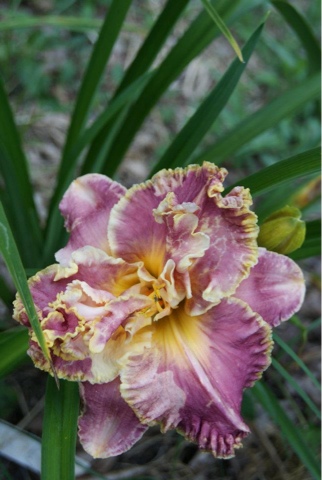Gerald Johnson and his wife Dianna visited Crossroads Garden Club last Monday and talked about his passion for gardening, and gave us useful tips to successfully grow bearded irises and beautiful daylilies. Gardening wasn't always a passion for Johnson. Having been "raised" on a farm, he vowed that when he grew up and left the farm, he would never return.
Thankfully, that didn't last for Johnson because he has become a landscaper and a Master Gardener with Cobb County. More recently, Johnson moved to Carroll County where he continues run his landscape business, along with both an iris farm and a daylily farm. He also has become a hybridizer of daylilies and should soon be selling his own varieties of daylilies, maybe some in the color of your favorite sports team.
Johnson began by telling use some helpful facts about irises. He is not only an expert, but is the past president of the Georgia Iris Society and has over 30,000 varieties of bearded irises.
Johnson's tips:
Never mulch irises. They need dry feet (or roots) or they could rot. Mulching holds the water in.
They don't like to be crowded, so don't hesitate to dig some up and move them when they grow too closely together.
Irises are sun lovers. They need plenty of sunlight, especially for the next next growing season. That doesn't mean they won't grow under hardwoods. Hardwoods lose their leaves and allow sun during the time buds are forming--which can be enough sun to successfully grow irises.
Irises Must have the proper fertilizer which is 6-12-12. Irises don't need a fertilizer high in nitrogen.
Fertilize them 60 days prior to blooming which is the end of March.
Correct fertilization will directly effect the size of the bloom.
The best time to move irises is July through October.
For companion planting Johnson suggest finding plants that won't crowd the irises and don't need too much watering.
Groundhogs and armadillos can dug up and destroy irises. Johnson had photos to prove this and suggested a large dog to keep similar pests from digging up iris roots.
Johnson has both a spring and fall sale for his irises and daylilies on his Carroll County farm.
Johnson is also a daylily hybridizer. He expects his first named varieties to be offered for sale this fall.
One popular attribute of daylillies are ruffles.
Johnson will be naming many of his new daylily varieties after sports teams because of the colors. One similar to the daylily above will be Tennessee Cheerleader.
Daylilies are easy to grow but are loved by both rabbits and deer. In fact, the flowers can also be eaten by humans and are good on salads. Johnson hasn't found too many ways to protect his daylilies from non-human predators.
Besides color, Johnson grows daylilies with enormous showy blooms.
Johnson was a great speaker and we appreciated him for his humor and obvious knowledge.
The next day after hearing Johnson's iris tips I removed all the newly placed pine straw from around my crowded iris bed. I am also looking for some 6-12-12 and i am thinking about where I need to move a few of my irises.
Photos courtesy of Dianna and Gerald Johnson.












What a wonderful post, Deberah! Such beautiful, beautiful photos - and such good information, wow!!! We inherited irises when we moved here and miraculously, they come back, every year. (without any work, on our part)
ReplyDeleteThank you to Gerald and Dianna, and a thank you to you and Everyday Finesse! Joanie
We really enjoyed visiting with your group and sharing our love for gardening. Hope everyone will visit our garden this year. The color should be back around mid April and I will let everyone know of our open garden dates. Also we are going to be starting a West Georgia Iris Society and would love for those in your group that have an interest in Iris to participate.
ReplyDelete